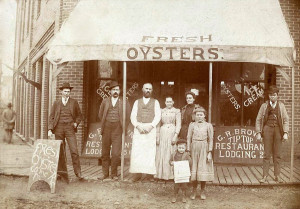If you’re someone who supports building walls around our borders to control immigration, consider something the next time you go out for dinner. If there were no immigrants working in restaurants, your meal would end up something like this: You’d wait forever for your food because there wouldn’t be enough line cooks to prepare it; your table wouldn’t be cleared because the waiters are all too busy to bus your table; the dining room would be filthy because it hasn’t been cleaned properly in weeks without a porter; and everything in the restaurant would be in disrepair because management used to off-load those jobs onto some kitchen guy who was handy with power tools. We won’t even mention the dirty dishes piling up by the dishwasher with no one to clean them.
The American restaurant industry has been artificially propped up on the shoulders of immigrants for generations—honest people who cook, clean, clear and serve in search of legitimacy and an opportunity for a better life. One indisputable fact that seems to be lost in this debate: Restaurants cannot exist—at least not in their current form—without immigrant labor.
These days, there is an endless stream of accolades bestowed upon bearded mixologists, tatted-up chefs and rockstar somms. Yet none of these individual accomplishments would’ve been possible without the support of thousands of nameless people who do the grunt work—endlessly chopping carrots, celery and onions into mirepoix, humping heavy wine boxes up and down cellar stairs and tirelessly polishing Riedel stems and Laguiole knives. Don’t expect to see any medals handed out for Outstanding Barback, Prep Cook or Nighttime Porter at this year’s James Beard’s.
 The Economic Policy Institute reported in 2014 that 15.7% of all U.S. restaurant workers are non-naturalized immigrants. It’s hard to measure how many are here illegally but estimates suggest that 20% of non-chef cooks are undocumented and one-third of all dishwashers. Because of the legal issues at stake, immigrants are an easy target. Those who most fervently support reform argue that illegal immigrants are a financial drain to the system. However, according to the Institute on Taxation and Economic Policy, undocumented workers contribute $11.6 billion a year annually to the American economy.
The Economic Policy Institute reported in 2014 that 15.7% of all U.S. restaurant workers are non-naturalized immigrants. It’s hard to measure how many are here illegally but estimates suggest that 20% of non-chef cooks are undocumented and one-third of all dishwashers. Because of the legal issues at stake, immigrants are an easy target. Those who most fervently support reform argue that illegal immigrants are a financial drain to the system. However, according to the Institute on Taxation and Economic Policy, undocumented workers contribute $11.6 billion a year annually to the American economy.
Almost everywhere you eat, your food is cooked and served by someone from another country. Most of the time you don’t see them. Many restaurant owners would prefer you don’t. Unskilled immigrants are willing to accept many undesirable jobs that most natives, even the unskilled ones, won’t. The willingness of immigrants to accept menial work in exchange for low-level wages subsidizes the cost of your meal. It’s hard to imagine what would happen if comprehensive reform discouraged or eliminated migrant workers from the F&B industry. Anthony Bourdain has said “Every restaurant in America would shut down.”
Chefs are already having trouble finding cooks. Suffice it to say, most restaurants would have no choice but to raise wages to make these jobs more attractive. That would inevitably translate into higher menu prices, putting many small businesses at risk.
But, sadly, that’s only part of the story. Immigrants—no matter how hard they work—are relegated to supporting roles and are given little opportunity for advancement. In fine dining, the highest paid positions are mostly staffed by men and are overwhelmingly Caucasian. A study by the Restaurant Opportunities Center investigated over 100 fine dining restaurants in California and discovered that 81% of management and 78% of high-level non-management positions like captains and bartenders were occupied by whites, mostly men. The study found that workers of color received 56% lower earnings than comparably qualified white workers.
It happens every day in the hospitality industry. Candidates who speak perfectly good English but have darker skin or a foreign accent—despite a proven track record of being loyal, hard-working and dependable—are passed over for promotion. Of course, like any industry, there are isolated success stories, but the game—at least for finding well-compensated work in fine dining—is rigged against you if you’re not white and male. The clientele in these establishments is predominantly white too and, though it’s unspoken, the assumption is that restaurant owners feel that having more minority staff members in plain view is a liability.
On the whole, immigrants work harder and complain less. They respect their earnings, too. Many support extended families in their home countries, own properties and start their own businesses. Surprisingly the non-immigrant front of house—who makes considerably more money than their foreign-born counterparts—has a higher tendency to be broke with nothing to show for their work. Immigrants in restaurants see their earnings as a path to a better life not something to be squandered on expensive late-night meals or overpriced cocktails.
You learn a lot from working alongside immigrants—more than just the useful curse words they teach you in their native tongues. They are given such little recognition beyond whatever meager monetary rewards but yet they consistently work more hours. Despite the ceilings that stand in the way of their advancement that would cause most workers to disengage, immigrants remain the backbone of the industry. If we wall them out, we will wall ourselves in. Instead, we should be taking note of their determination and raising our game.
 Our industry needs these workers. As long as we keep America great, the most determined immigrants from around the world will find a way to live and work here no matter what obstacles we build. So rather than excluding them why not find a sensible solution that allows them a path to legitimacy? Building walls is always a dangerous proposition because sometimes the grass is greener on the other side.
Our industry needs these workers. As long as we keep America great, the most determined immigrants from around the world will find a way to live and work here no matter what obstacles we build. So rather than excluding them why not find a sensible solution that allows them a path to legitimacy? Building walls is always a dangerous proposition because sometimes the grass is greener on the other side.

